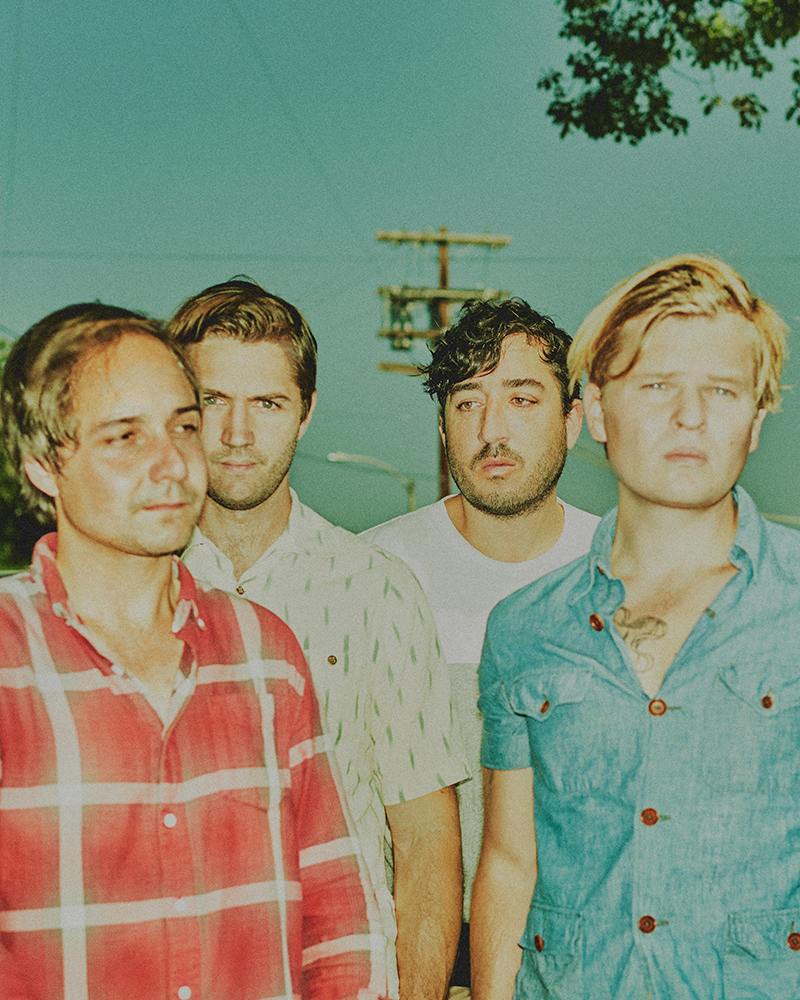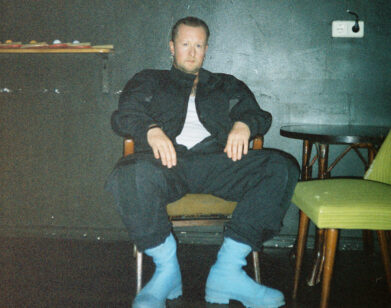How Grizzly Bear created their most accessible album to date
For a time at least, it seemed as if chamber pop band Grizzly Bear was finished. On a solo tour stop in 2014, guitarist and vocalist Daniel Rossen said there was “no clear plan” for the band to get back together. After their 2012 album Shields, Grizzly Bear—Rossen, Ed Droste, Christopher Bear and Chris Taylor—took an extended hiatus, during which some pursued solo projects, others got back to living, and the music blogosphere that catapulted them to Hype Machine heroes essentially dried up. Then it was announced in 2015 that work had begun on a fifth album. The two years that followed were an experiment in democracy, each member contributing a sizable amount to Painted Ruins, Grizzly Bear’s most listenable album to date.
With the release of Ruins, the four-piece band returned to a landscape that appeared alien to them in more ways than one. Post-election, suddenly everyone and their dog was making political music, latching on to pulpit pop that left little room for a band whose prog-folk defined an era of hipsterdom. Their contemporaries, the Fleet Foxes, also ghosted the music scene for six years. The question wasn’t so much if these bands would ever return, but how? The answer was to double down on what they did best: For Grizzly Bear that meant a more layered, pulsating collection of music. With songs like “Mourning Sound” and “Cut-Out”, they opted for a rhythmic intensity that hadn’t defined their earlier releases.
Ruins has a sense of fun while still maintaining a political stance that easily contrasts the more ham-fisted political tunes du jour that other artists have released in the wake of whatever you want to call what’s happening now. It’s a bold choice that paid off, a gorgeous escape from the banal volley of the “fake news” cycle. Having been gone for so long, it’s a familiar comfort to have Fleet Foxes and Grizzly Bear back in our headphones. After the first spate of shows on their tour, Fleet Foxes’ Robin Pecknold caught up with the band that, even though they’ve tried, will never disappear completely.
ROBIN PECKNOLD: I’ll start by congratulating you guys on your new album. I think it’s really amazing. Definitely the best that you’ve ever done, and I’m glad that you guys decided to do it again; you’re back. Because I think the music world was really missing something without you guys being active, so thank you for doing it again and being back with the release and everything. I’m just curious, this is just something I think about a lot when I’m writing lyrics especially. I would like to react to things that occur in my life and write to them but I don’t necessarily want to be making content out of my own experiences, or monetizing my strife, you know? So is that something that you think about while you’re working on music?
ED DROSTE: That’s a good question and having done now… I don’t know, 60 interviews, and having forgotten what the whole dance around lyrical content journey is like—I think there is a piece of me that’s hesitant to get too specific for fear that, one, it’s going to create some narrative that isn’t really representative of the album. And, two, going to raise questions that I don’t feel comfortable asking. But it is interesting when you say you don’t want to monetize your strife. I don’t want to draw attention to a situation—which I’ve seen happen in other albums and artists—that could potentially cause additional pain for other people that may have been involved in your life. I’ve always loved to sing with somewhat vague lyrics so people can have their own interpretation and find their own meaning with it. I’ve become a bit more comfortable speaking about personal matters within the lyrics, but at the same time, there is an element where I’m not always sure how far I want to take it. There are certain topics that I’m discussing that I haven’t explicitly explained to my bandmates. That’s just for me to know, and I’m not going to talk about it anywhere. [laughs] I know that I’m referencing that and other people think it’s about a relationship, but it’s not. So it’s my own personal thing, and if someone picks up on it, good for them. I’m not going to confirm nor deny it, but it is something that I think about. I try not to overthink it. But it is something that factors in because it’s real easy for a narrative to be set up. Something can become a divorce album within two sentences in an interview. And everyone just picks up on it and it’s like, actually, this album has nothing to do with that. I’m interested to hear your side of that, actually.
PECKNOLD: I feel the same way you do. I don’t want to be bringing people into it that don’t need to be. Expressing myself in lyric form isn’t so important to me that I feel muffled or silenced by that kind of lyric consideration. It does feel like I am being a little bit more obtuse than I am would there be no audience at all. That just is what it is.
DROSTE: I haven’t sang about explicit sex acts. [laughs]
PECKNOLD: I’m going to move on to asking Chris Bear and Chris Taylor—I really admire both of you guys, both as players and songwriters, and the band as a whole for being from the outside, the democratic ideal of the band. There are the delineative roles you guys have in the band for the public, and I know that everyone is way more involved in every aspect of it than is broken down publicly. Is that something that you guys think about, or that concerns you?
CHRISTOPHER BEAR: I think we all think about it in ways. It is sort of unusual. I think people are used to a group having one main creator out of convenience. To a degree, we try and always make the presentation of this as open as we can, but you only have a certain amount of control over that. It seems like it’s hard to change how people perceive your music without it becoming annoying to direct people how to understand how it was made. In the end, I feel like if we’re happy with the record, that’s the end goal.
CHRIS TAYLOR: As far as the music part, you keep it kind of vague. You don’t put all the details out there or raise your hand as to who played what. You asked if it’s important—it is important for people to know that I do this production, engineering and mixing part because it isn’t something that would be common or expected of a guy in a band. But it is a substantially large amount of extra work that I do. I’m very proud of it, and I work hard doing it. I also like to work with other bands. I would be psyched if people knew that I do it, but who’s to know because there are no liner notes anymore in the land of streaming. It’s all lost, so you can only do so much.
PECKNOLD: How long would you say it took to get on the same page while you were making the album, and how long did it take until you felt like the record was going well? I ask that because the record that I just made [Crack-Up], three months into recording I felt like it was actually coming together; it was getting somewhere. We were cooking with the cats, as it were. [laughs]
DANIEL ROSSEN: It depends what phase of the record we’re talking about. It took a few months to have demos that we collectively felt something about. For us, there’s a process of coming back together and understanding what everyone is into and what everyone wants to do so that we aren’t making different records at the same time as one another. So there’s that part, that took a little bit of time. There are a few things that were definitely working and others that were question marks for a really long time. We specifically left it open in a way, not even committing to thinking of it as a record for a while. We wanted to be a little more OK with some of those question marks, and let some of those songs be open-ended and be unfinished and be confusing. At least, that’s how I thought of it. Earlier records maybe we’d come at it with a little more intensity and there would be a lot wrapped up in individual songs, forcing them to work. We were trying very hard to not do that this time.
PECKNOLD: I imagine the way your band is structured and the way you guys work, is it right to say that you guys don’t go into the album with really hard and fast rules about how the album should end up, because you know there are three other equal voices that you’ll need to jive with.
ROSSEN: Definitely. The more we do this, the more we try to account for that, and make sure that we are considering each other and considering what everyone wants to do individually too. So it’s not like one person is leading the others into something they don’t want to have to think about for the rest of their lives, as part of our catalog. [laughs] So we’re all trying to make it as even as possible in that regard. Continual process of compromise, which is difficult in some ways but a relief in other ways. It doesn’t have to be on any one of us, and it doesn’t have to be entirely any one of our visions. We can share the burden in that way. It can be confusing and hard to know what’s going on sometimes but it’s also a real privilege that we can do that. I imagine that’s very different for you, because the burden’s just on you a bit more, I would assume.
PECKNOLD: More so, but I still try and let it go where it seems to want to go. What’s working, and what’s not working—that makes itself clear in the doing of it. As we are now thirties range—I read something where, Daniel, you were talking about how you wanted the record to be happy because you don’t have the patience for sadness that you did, creatively, or for depicting it in song as you did when you were in your twenties. I feel that way as well. I understood what you meant. We’re on tour now and we’re playing some older songs that we’ve done, and they’re actually a little too slow, or a little too ‘searching’. They’re just from a different mental space, a different time in my life. Was that something you realized while you were making the album, or something you realized after the fact? Because there’s a more rhythmic intensity throughout this record than on past records.
ROSSEN: We talked about this a little bit over the last couple of years. Not that I don’t have any interest or patience for that kind of music. We did it so much when we were younger, and you need to assign a lot more value to your very important feelings when you’re a younger person [laughs], but for the last few years while we weren’t working together I made a lot of really depressing music that I just kept throwing away because I didn’t really want to see it to completion. I felt the need to keep doing some version of that, but I didn’t actually want to put it out. It didn’t communicate anything interesting that I felt was any help to me or to anyone.
PECKNOLD: Do you consider the political climate at all, either while you were making the album or now while you’re touring the album?
ROSSEN: Just the idea of being able to connect with people in a more direct way through music. I mean there’s certainly a real comfort there in a time like now. Beyond that, I don’t think we have any interest in being a topical songwriting band and we never will be that. But I think that ability to connect with people is a huge value.
BEAR: I know when there are artists that put out music that I really like and it’s new, even if I’m in a bummer state, that lifts me in a way. If I’ve been having a rough couple of weeks or just feeling the weight of the world and go to a show and have a really nice experience—you can sort of lose yourself for a minute. There’s a lot of value there. I wish there was something more it could provide in a time like this. It also is what it is. I think it’s nice if music can provide a respite from the barrage of doomed crap happening all the time.
ROSSEN: And also some kind of confirmation that human life goes on. There are still things in life that can be expressed that aren’t necessarily related to bigotry or whatever the barrage of the moment is. That doesn’t have to take over every single aspect of life. There is still human experience to be had. There’s some confirmation of that—you can keep going, and making something and sharing that with people—there is a real value in that. Even if you’re not acting as a really political artist. I do think there’s value in that alone.
PECKNOLD: I’ll just say personally that part of the reason that I didn’t release an album for as long as that period was, is that I’d look at the climate of music every once in a while and I didn’t feel like there was a place that made sense [for me]. It was just my feeling about it. Either a bunch of new things were happening, or a more commercial wave of the thing I was passionate about was happening. I didn’t see where I would fit in the thinkpiece ecosystem, and so I checked out until I was at the point where I didn’t really think about any of that stuff anymore. I still thought about it, but not in the sense that it would influence my choices or my decision-making in the way it did before. So in that sense, it wasn’t really about imbuing a sense of mystery unto myself as much as it was just not wanting to engage. If you choose to make it so, it can be stressful or crazy-making.
DROSTE: I have a lot of similar feelings that you had, but I’m having them right now. I tuned out for a couple of years, and I didn’t pay much attention. When I got back I was like, “What the hell is happening?!” A lot of what you were thinking I’m like, “What’s the vibe right now? What is this trend? Why is everyone reinventing themselves? Why is this Top 40 artist with this random song that’s fine being championed as the best thing ever right now?” There is a bit of a headscratcher moment for sure. Trust me, I like Top 40, so it’s not a diss to that. It’s just, something happened while I was sleeping, and getting divorced and thinking about myself, and not paying attention to the dwindling blogosphere which doesn’t really exist anymore and is now just the noise content machine. I find it overwhelming and confusing. It’s less about “Is there a place?” but more like how do you get people who are subjected to so much noise to actually sit down and take the time with something that you’d really hope they’d take the time with? Or previously they [took the time], but they may not be doing that anymore because of the way that music is consumed or read about or disseminated. I don’t think that there is any desire for mystery, per se. But I do find the current climate a bit mysterious. Nobody has fully explained it to me other than “clicks”. That’s my hot take.
PECKNOLD: What are you guys listening to right now?
BEAR: Always a hard one. Maybe not so much during the making of the record but over the last however many years, I’ve continued diving deeper into Brazilian music and that whole world, and becoming obsessed with Marcos Valle and his different phases of musical career. I’ve been loving the same jazz records I’ve always liked for a while but maybe feeling more comfortable with embracing that and applying some of that thought process to our music. New stuff? I don’t know, what are you guys feeling?
TAYLOR: Really funny Bear should say that. I was going to say the same thing. I just continue to dive deeper into Brazilian pop music of the ’70s. And generally, I haven’t been listening to as much music because I’ve been working on the album, but when I do listen to music, I’ve really been buying nice copies of jazz records I used to lose my mind over as a teenager. Dan had come to town to start rehearsing and he stayed at my place. We just hung out and listened to [Miles Davis’] Bitches Brew all the way through it and talked. I’ve been really into that lately, digging into my lifetime favorites but listening on a nice copy of vinyl. I’ve been listening to a couple of podcasts but that has been getting me a little bit worn out. Ben Frost, his new records are really incredible. Clark, his new record is amazing. The Haxan Cloak really freaks me out and makes me feel really cool and weird when I listen to that stuff. I guess it’s all pretty dreary, dark stuff. But it’s kind of how it feels a lot of times these days. [laughs] I listen to the Kendrick Lamar record over and over and over again. It’s just so brilliant.
PECKNOLD: I’ve been trying to get back into The Rolling Stones and Led Zeppelin. In high school, I had Led Zeppelin III and a passing interest in the rest of the stuff. Now I’m on that same tip of not making depressed music anymore. You were talking about The Haxan Cloak or dark, downbeat stuff. There’s this record store in New York called Commend, which is run by [Red Velvet Music Group], this label.
TAYLOR: Amazing, amazing taste that guy.
PECKNOLD: I go in there and I don’t know what anything is. I remember being 22 and going into record stores and having everything dialed, you know? I guess when it was a different type of store or I was looking for different stuff. I go in there and I don’t know up from down. It seems hard to crack, but there’s this Music from Memory label that I’ve been listening to releases from.
ROSSEN: I love that label.
TAYLOR: Totally.
ROSSEN: Leon Lowman is pretty special.
TAYLOR: That label is amazing, Music from Memory.
PECKNOLD: I always love your guys’ albums because you’re hearing the conversation between you guys as players on every song. It’s a distinctive communication you guys have together. Either directly, like where Daniel is acting as the foil to Ed’s voice, or just musically where the rhythm section or the guitars—it’s just very conversational. There’s also music as a conversation between bands and their audience or the zeitgeist. Do you think music is more valuable if it’s thought of as a conversation between an audience and a band or if it’s mainly thought of as a conversation internal to the band itself?
TAYLOR: I feel like the real strength in our band is the fact that we can have a conversation with one another about where we want the music to go. That’s part of what makes us us. I can really only work on what I work on with the dudes and basically worry about that. That’s how we’ve always worked. We’ve never really thought of ourselves as trend predictors by any means. I think we always sit on a weird boat in our own zone, just doing our thing in a way. Some people know exactly what’s gonna hit, and that’s just not how we’re wired. But both are important and both work really well. Having a conversation with the audience, actively doing that, is an impressive thing. That’s the strength of a pop star, Michael Jackson, whatever. They just know. That is something amazing to witness. Kendrick Lamar, these stars of all time. Both are worth doing. It gets tough if you try and do the wrong approach. You know what I’m saying?
ROSSEN: Whether you’re in conversation with the audience or the zeitgeist is not for us to worry about. Maybe it’s naive. All you can really do is what you’re interested in and what you think is working or appeals to you. And if you’re lucky it is in conversation with everything going on. I have a very passive relationship to that kind of question. All we can do is what we know how to do. If we’re lucky it works in the world. How do you relate to that problem?
PECKNOLD: I agree with you guys that it’s best left to other people to decide, to not worry too much while you’re doing it. Taking a concerted break from the music “conversation”, and focusing on other things was an effort to arrive at something that I felt more ownership of, that was less related to that conversation. Does that make sense? And now I’m noticing that it’s not connecting with—maybe because it’s early shows or something—I feel like when we’re doing it in the show, it’s not as much of a feeling of a conversation with the audience as the old songs are. So I don’t regret it because I feel more ownership of this album and I feel more proud of it for that reason, but I am noticing some kind of dulling of an audience response.
BEAR: That also may be a product of early days shows, where people are learning your record. I also do wonder if it’s part of what has become more of people’s listening experiences—the streaming thing, and not necessarily even feeling like you have to commit to checking a record out. Not having to purchase anything. Maybe there’s this subconscious thing where you feel less invested in it somehow as a listener? I’m just riffing here. I feel like that could be a thing. We’ve only done three shows so far, and our record wasn’t out, but I’ve noticed that. Older tunes got a little more of a reaction. And some older, older tunes that we haven’t played in a long time haven’t got reactions. But maybe these things just take time, and why we’re not feeling fully tapped in to what the zeitgeist is, and finding the people who really love it.
PECKNOLD: I think your music is so singular that you don’t have to worry about that at all. You’re definitely just refining that as you guys go and making it stronger and more fluid, coming from already doing some of the best shit in the last two decades.
TAYLOR: We can’t worry about that stuff. Like I said, we just fit into that column B of those who can really only worry about what we do. It just takes longer for our music to sink in, like Bear was saying. It’s just kind of the way it works. And people have had these songs rolling around in their shuffle for 10 years and they’re going to know it more and love it more than the new stuff. Both of our bands are ambitious and trying to develop our thing. It’s going to take a second for people to catch up with it. That’s a good problem to have.
GRIZZLY BEAR’S FIFTH STUDIO ALBUM, PAINTED RUINS, IS OUT NOW.







